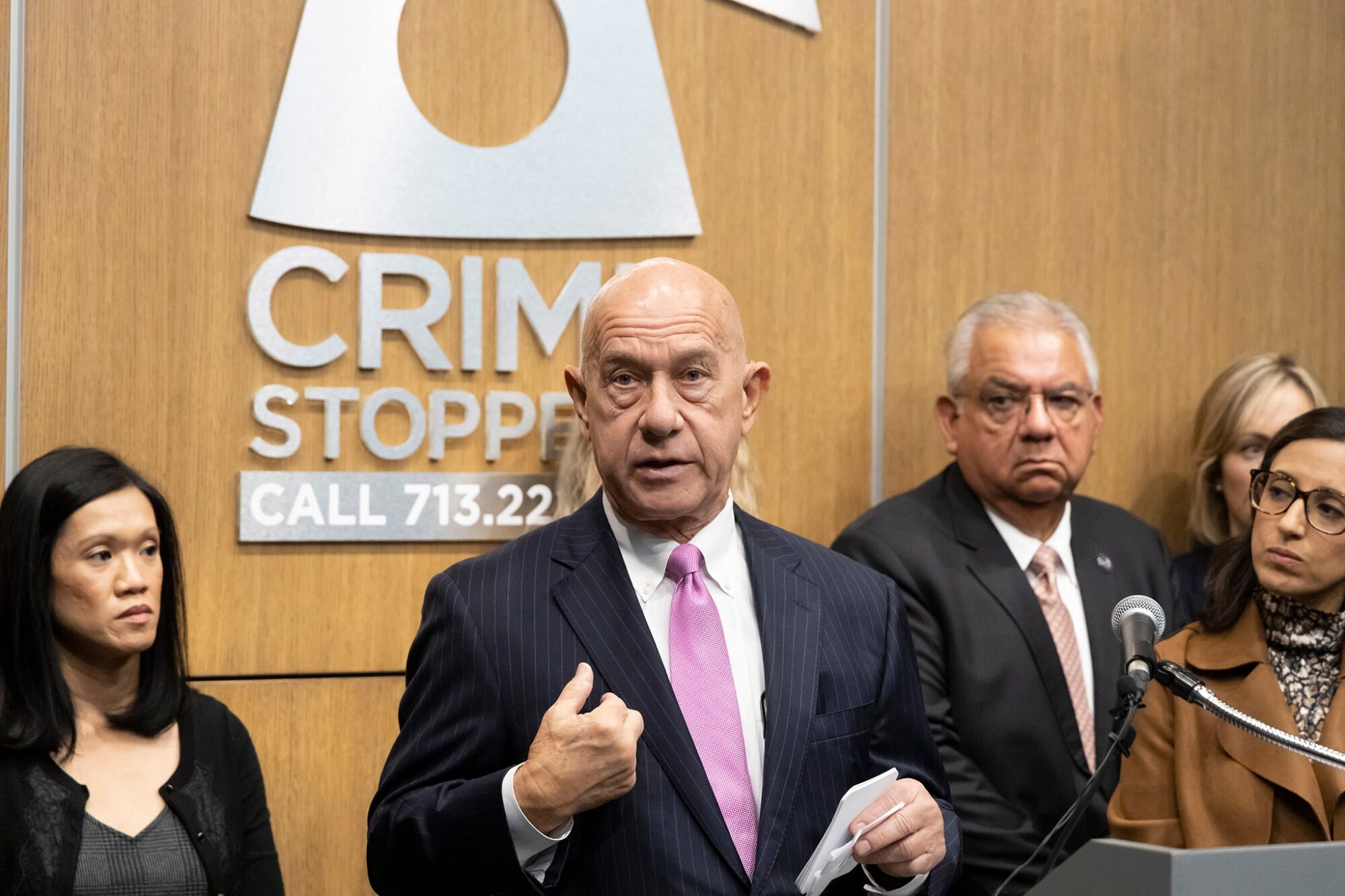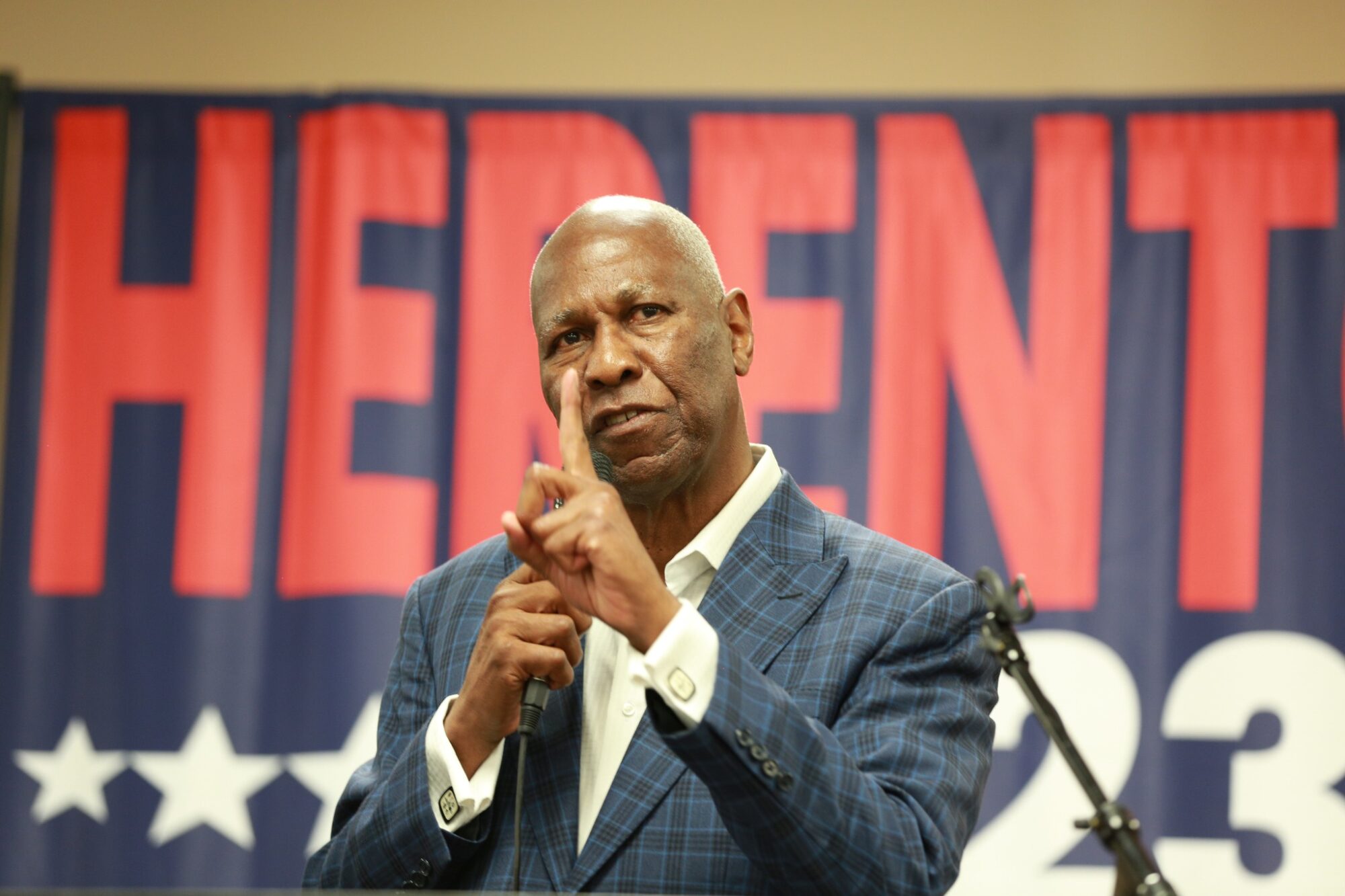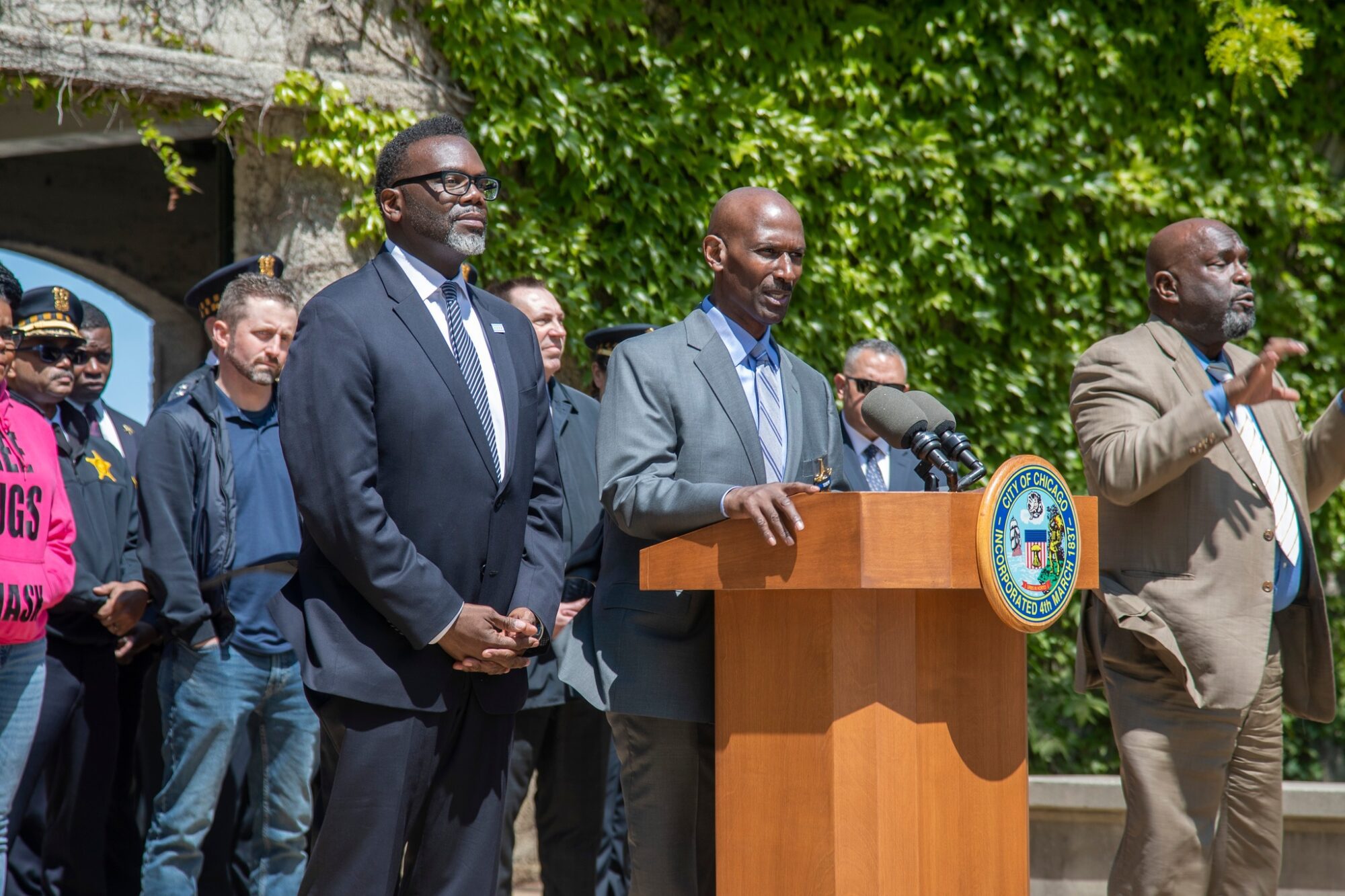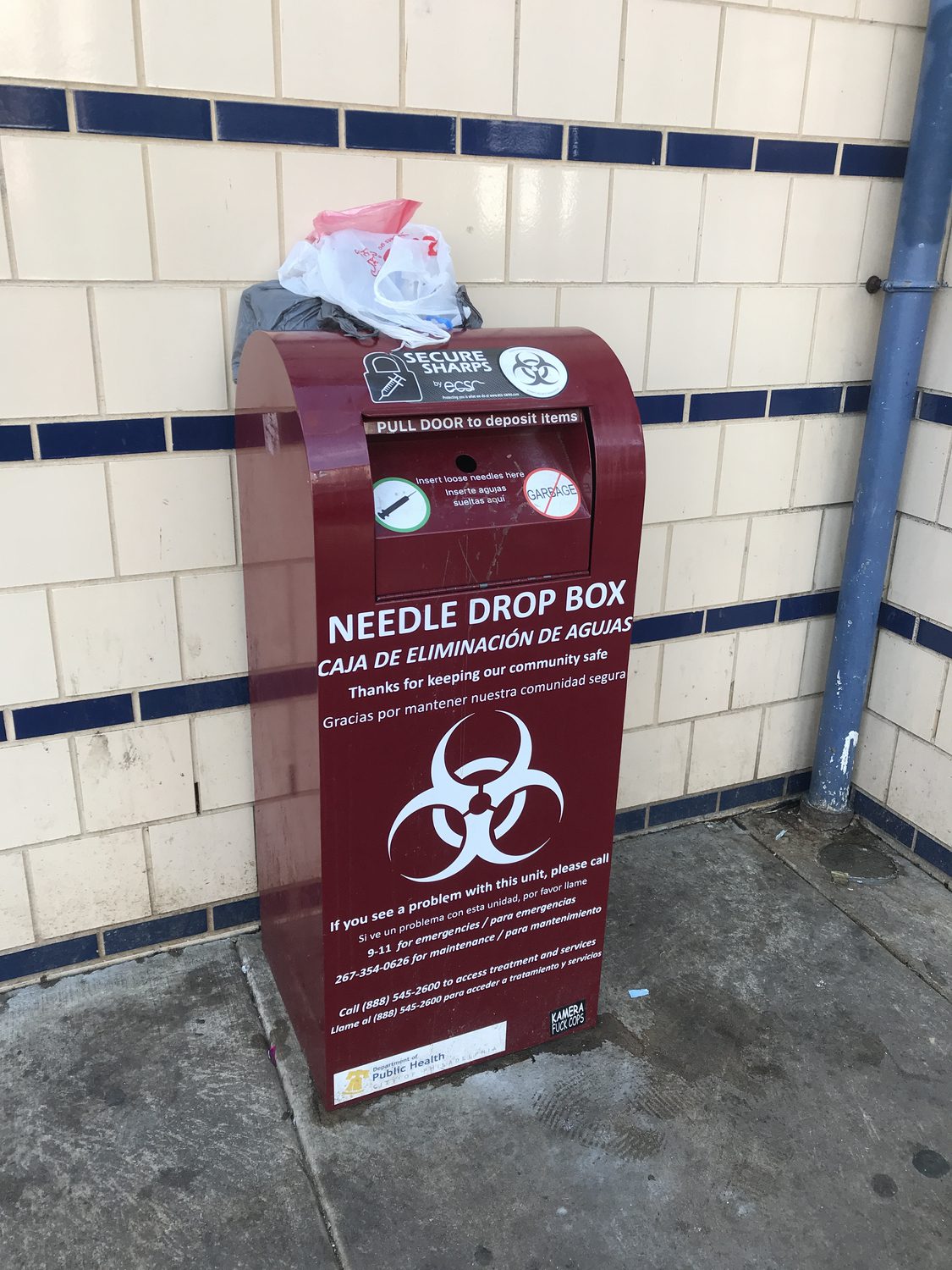Promises to Scale Up Policing Stir Houston’s Mayoral Race
John Whitmire, a state senator who’s helped steer criminal justice in Texas for decades, is vowing to deploy state troopers in Houston in his run against U.S. Rep. Sheila Jackson Lee.
Michael Barajas | November 16, 2023


When speaking to voters, John Whitmire often travels back to New Year’s Day in 1992, when a gunman robbed him outside his northside Houston home, stealing his wallet and his wife’s purse.
Whitmire, a fixture of Democratic politics in Texas and state lawmaker for half a century, has made the story central to his campaign for mayor of Houston this year, weaving it between calls to jail more people, aggressively hire more police, and deploy hundreds of state troopers to patrol the city. “When I watch the crime that’s in Houston, it alarms me,” he said in a recent campaign ad where he talks about the robbery three decades ago. “You know, I was robbed at gunpoint in my garage, and I definitely thought he was going to kill me, my wife and my 9 year old daughter. And it just changes your life forever.”
Whitmire finished on top of a crowded field of 17 other candidates in the Nov. 7 election, winning 42.5 percent of the vote. He now faces a Dec. 9 runoff against Sheila Jackson Lee, the longest serving member of Houston’s congressional delegation and another towering figure in Democratic politics in the state, who came in second last week with 35.6 percent.
The mayor’s race has spotlighted the tough-on-crime politics that still dominate debate around public safety in the nation’s fourth largest city. Police in Houston have a long history of brutality and impunity, while Harris County, where the city is located, was until recently known as the death penalty capital of the world for how many people it has sent away for execution.
In recent years, local debates and policies around criminal punishment started to shift as Democrats solidified control of the county government and as activists pushed for reforms. Throughout the two terms of Mayor Sylvester Turner, who could not run for reelection this year due to term limits, advocates lobbied him to implement police reforms, with mixed results: Turner updated policies to increase access to officer body camera footage and promised greater police oversight but he also balked at other requests. He resisted demands that the city make its contract negotiations with the Houston police union, which determine many oversight and discipline policies, a public process, as it is in other major Texas cities like San Antonio and Austin.
Heading into the city’s municipal elections this fall, advocates for police reform tried to turn the mayoral race into an opportunity for broader discussion around public safety and changes they want the city’s next mayor to prioritize. Under Houston’s “strong mayor” form of government, the mayor wields enormous power over city policy by appointing each department head, overseeing all administrative work, and setting the city council’s agenda.
A coalition of community and civil rights groups, which called themselves RISE Houston (or “Reimagining Safety for Everyone in Houston”), developed three demands for candidates: reducing minor traffic stops that disproportionately target Black drivers, ending a controversial multi million dollar police surveillance contract that has proven ineffective, and freezing the city’s police budget.
But when the coalition tried surveying each candidate on those issues, few responded or took any concrete positions. Neither Whitmire or Jackson Lee, the political juggernauts in the race, even attended a forum on public safety policies that the coalition held in early October—although Jackson Lee, who was in Washington D.C. at the time, spoke to the crowd virtually later in the event.
RoShawn C. Evans, one of the activists who helped form the coalition, said the local criminal justice reform group that he co-founded in 2015, Pure Justice, had considered making endorsements for the first time this year but eventually decided against it.
“We chose not to because of the narrative around public safety,” Evans told Bolts. “It’s very bothersome that I’m watching all these candidates run to represent the city of Houston and the platform that they’re running on is a platform that is around the narrative of mass incarceration. Every dollar we put into law enforcement, every dollar we put into building a new court or hiring more DAs, it opens the floodgates to mass incarceration even wider than what it already is.”
Whitmire, who has led in both polling and campaign funding throughout the race, helped set the terms of debate during the race with his promise to be “tough and smart on crime.” Like in cities across the country, violent crime rose in Texas’ largest city during the pandemic and remained a top concern for Houstonians surveyed before this year’s election, even as crime rates have started to fall.


Whitmire is a rare Democrat with any semblance of power in the GOP-dominated Texas legislature. As chair of the Senate’s criminal justice committee since 1993, a position he has retained since the Republican Party solidified control of the chamber later in the 1990s, he has sat at the center of the state’s policies around criminal punishment for decades. In the 1990s, Whitmire was an architect of policies that scaled up incarceration in Texas, helping pass a legislative package that increased prison time for serious offenses and pumping $1 billion into an unprecedented prison-building boom. Later, in the 2000s, he helped expand diversion programs that reversed the trend and staved off even more prison building.
In more recent legislative sessions, advocates have criticized Whitmire for being a barrier to change, saying the senate criminal justice committee has become a killing field for reform legislation under his leadership. He has refused to consider reforms the Texas House has passed, such as legislation raising the age of criminal responsibility to 18 (Texas is one of only three states that charges 17 year olds as adults) and efforts to install air conditioning in the state’s dangerously hot prisons. Even reforms he claims to support, like “second chance” legislation to allow reconsideration for people sentenced to life in prison as children, have derailed in the committee on his watch.
Whitmire, who didn’t respond to questions for this story, has defended his legislative record and insisted reform advocates have unrealistic expectations, telling the Houston Chronicle recently, “I don’t think any criticism has an appreciation for the difficulty in Austin of doing criminal justice reform at any time in the 30 years that I’ve been chair.”
Civil rights advocates in Houston are particularly worried about one of Whitmire’s core campaign proposals, to bring in more state troopers from the Texas Department of Public Safety (DPS) to help patrol the city, warning that it will worsen racial disparities in policing in Houston. The actions of the state agency, which is far whiter and less diverse than Houston’s police force, have raised concerns about racial profiling and police brutality when troopers have been deployed to patrol other cities and along the border with Mexico.
When Austin city leaders tried the approach earlier this year, troopers primarily arrested people of color before officials called off the partnership. When Dallas brought in DPS troopers in 2019, some local leaders criticized the agency for acting like “an occupying force.” Christopher Rivera, an outreach coordinator in Houston for the Texas Civil Rights Project’s criminal injustice program, pointed to a report the group put out earlier this year showing minor traffic enforcement already disproportionately targets Black drivers in Houston. While activists have asked for an ordinance limiting traffic stops and police encounters for non-moving violations, like expired registration, they now worry Whitmire’s proposal for DPS patrols could exacerbate the problem.
“Probably the most concerning thing that has come up in the race has been the DPS issue,” Rivera told Bolts. “When we bring more police into the city of Houston, they just end up over policing more neighborhoods of color and low income communities.”
Rivera said local activists hope that a change to municipal government that voters adopted last week will open the door to more reform discussions at city hall, regardless of who’s in the mayor’s office. More than 80 percent of voters approved Proposition A, which gives city council members more power to force the council to take up issues even without the mayor’s approval; beginning next year, any three of Houston’s 16 city council members can join together to put items on the council’s agenda.
Progressive advocates in Houston are hopeful that they’ve retained some footholds in municipal government in this fall’s elections. Council Member Tarsha Jackson, who was formerly a top staffer with the Texas Organizing Project (TOP), which has become a driving force in left politics in the state, won reelection last week. Council Member Letitia Plummer, who has advocated for changing how the city spends money on public safety, faces a runoff against challenger Roy Morales.
While Whitmire has the backing of local and state police groups in his run for mayor, Jackson Lee has garnered endorsements by more outwardly progressive organizations and leaders, like TOP and also Lina Hidalgo, Harris County government’s chief executive, who has supported bail reform and pushed back against some of the district attorney’s funding requests. While Jackson Lee has used a different tone from Whitmire when talking about crime, she has done little to carve out a competing vision around public safety and has offered few specific policy priorities on the campaign trail.
Jackson Lee, who did not respond to questions for this story, expressed some caution about Whitmire’s plan to deploy state troopers during one of the final televised debates in the race last month.
“I give them credit for their investigative skills, they will be used for that, but not patrolling our neighborhoods where our families are looking to those they know and those who know them,” she said, promising instead to “expand” the presence of local police.
On election night, Jackson Lee thanked her supporters and spoke in broad terms about combating gun violence, increasing mental health services, and “making sure that every corner of this city will be represented at the table of empowerment.” Across town, as he addressed his supporters, Whitmire again returned to his own brush with crime three decades ago.
“Let anyone who can hear my voice: I don’t apologize for being tough on crime,” he said. “I’ve had to beg for my life and my wife and my nine year old daughter in our garage. That person put a gun in my face and I thought I was finished. I was worried about my daughter and my wife. But God had a plan for me.”
Correction (Nov. 17): An earlier version of this article misstated the result for one of Houston’s council seats; Letitia Plummer and Roy Morales will face off in a runoff.
Stay up-to-date
Now is the best time to support Bolts
NewsMatch is doubling donations (up to $1,000) through the end of 2023. Support our newsroom today and increase the impact of your gift.




